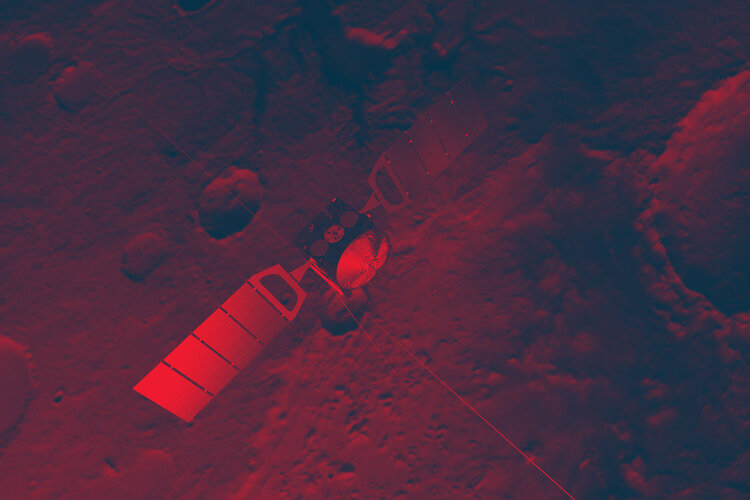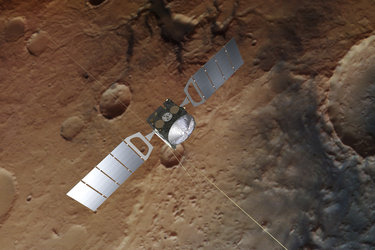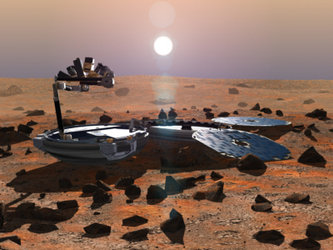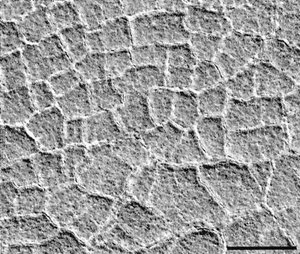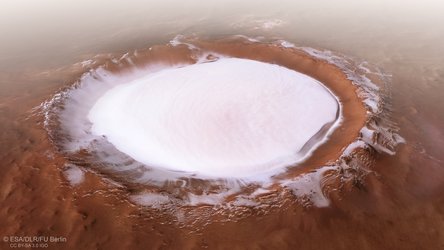Man with a plan: An interview with Gerhard Neukum
There are only a few people who can say that they originated the idea to send a European spacecraft to Mars. However, Gerhard Neukum has a good case to make this claim. In 1996, having watched his pioneering camera fall into the Pacific Ocean on board Russia's ill-fated Mars ’96 mission, he needed to find a spacecraft that could take his instruments to Mars.

Gerhard Neukum
Professor of Planetary Sciences, Freie Universität Berlin
Principal Investigator, HRSC, Mars Express
Born: 23 February 1944 in Johnsdorf, Germany
Gerhard studied physics at the University of Heidelberg, but later converted to study Geosciences, completing a doctoral thesis on lunar rocks, when he became involved with the NASA Apollo programme.
Since then, his unique combination of skills has led to his taking part in a range of space science projects, while taking the positions of Director of the DLR Institute of Planetary Exploration, Berlin, then the Professor of Planetary Sciences at the University of Berlin. He is also member of the imaging team on the NASA/ESA Cassini/Huygens mission, which returned exciting images of Saturn in November.
He is the pioneer of the HRSC camera, which will be the first to provide high-resolution 3D images of the surface of Mars.
Gerhard is married with two grown-up children, and lives in Germany, where he enjoys gardening in his spare time. He also tries to inspect the botanical gardens in every city he visits.
ESA: How do you feel as Mars Express gets so close to its final destination?
Gerhard Neukum
I am getting very excited. I am looking forward to Mars Express having a healthy, successful insertion into its orbit around Mars. We know that this is the most critical stage, since NASA’s Mars Observer orbiter exploded when its engines were re-ignited as it arrived at Mars. However, we have already had a test of our systems and so I am feeling confident.
When you look at Mars, it makes you realise how lucky we are that we are here at all.
ESA: What most fascinates you about Mars?
Gerhard Neukum
Mars’s history resembles our own so closely, which makes it one of the most interesting terrestrial planets. When you look closely at how Mars has evolved, it makes you realise how lucky we are that we are here at all, and that life has developed to such high levels of diversity to produce human beings.
We are investing in the future of generations of scientists to come... and we may be preparing the ground for somebody to go to Mars one day.
ESA: What is your greatest hope for the HRSC camera?
Gerhard Neukum
That it will provide the first 3D map of Mars at a resolution as high as 10 to 20 metres, in some places at 4 metres, and even in colour. We hope to produce a data set that is unique, and that will lay the basis for further studies of Mars.
In a way, we are investing in the future of generations of scientists to come. We will be uncovering a whole new world in 3D, showing exactly what Mars looks like as though the images were taken from a low-flying aeroplane. And, who knows, we may be preparing the ground for somebody to go to Mars one day.
After 15 years, I have finally managed to fly HRSC on the first European Mars mission!
ESA: What drives you in your job?
Gerhard Neukum
Ever since I watched the camera I had developed for Mars '96 fall into the Pacific, I have wanted to fly our instrument. That incident affected the lives of myself and my family very deeply – there have been many highs and lows since for all of us.
But it is not easy to get a camera on board a spacecraft. The camera becomes the most politically sensitive instrument, because it provides the images that everyone will see, and so it seemed virtually impossible to get another one on a US spacecraft. It has been a very demanding experience politically, but after 15 years, I have finally managed to fly HRSC on the first European Mars mission!
ESA: How did you first become interested in space science?
Gerhard Neukum
I read a lot of great science fiction stories when I was young. I also feel very lucky that I came in touch with planetary science while at University through the Apollo missions. If I hadn’t, I would probably have gone on to study high-energy physics and life could have been very different.
Be patient, persistent and, above all, optimistic.
ESA: What advice would you give somebody who wanted to work in space research?
Gerhard Neukum
Of course, it is a fascinating field, but I would remind them that you have to be patient, persistent and, above all, optimistic. The rewards sometimes take years and years to materialise. You also have to be flexible about where you live, as you could find yourself anywhere in the world in order to find a good position.















 Germany
Germany
 Austria
Austria
 Belgium
Belgium
 Denmark
Denmark
 Spain
Spain
 Estonia
Estonia
 Finland
Finland
 France
France
 Greece
Greece
 Hungary
Hungary
 Ireland
Ireland
 Italy
Italy
 Luxembourg
Luxembourg
 Norway
Norway
 The Netherlands
The Netherlands
 Poland
Poland
 Portugal
Portugal
 Czechia
Czechia
 Romania
Romania
 United Kingdom
United Kingdom
 Slovenia
Slovenia
 Sweden
Sweden
 Switzerland
Switzerland


























